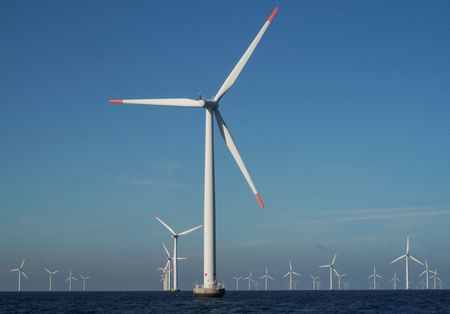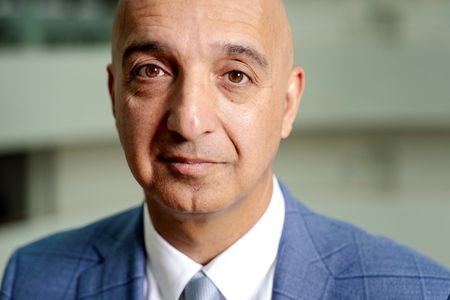COPENHAGEN (Reuters) -Denmark’s Orsted said on Monday it agreed to sell a 50% stake in Britain’s Hornsea 3 offshore wind farm for around 39 billion Danish crowns ($6.09 billion), widely regarded as a crucial move to prevent a crippling credit rating downgrade.
Orsted, the world’s largest offshore wind developer, is trying to restore investor confidence as it faces rising costs from supply chain disruptions and inflation, as well as uncertainty wrought by U.S. President Donald Trump’s opposition to renewable energy.
The stake in the 8.5 billion pound ($11.41 billion) project was sold to New York-listed Apollo Global Management, which manages more than $800 billion in assets, leaving Orsted with 50% ownership.
“The transaction represents a key milestone in Orsted’s funding plan and balances the key objectives for partnerships and divestments with an emphasis on capital management,” Orsted said in a statement.
APOLLO INVESTS IN EUROPEAN ENERGY TRANSITION
Apollo’s investment includes a 50% stake and a commitment to fund 50% of the project’s remaining construction costs.
“This is the latest large-scale transaction here in Europe where we are investing behind energy infrastructure, transition assets, AI and other key priorities,” Apollo Partner and Co-Head of European Credit Leslie Mapondera said in a separate statement.
Earlier this year, Apollo said it would provide 4.5 billion pounds in financing to support Britain’s long-delayed Hinkley Point nuclear project.
Orsted in October raised $9.4 billion through a heavily discounted rights issue to shore up its balance sheet, and later announced it would cut about a quarter of its workforce by the end of 2027. Shares closed at 115 Danish crowns on Monday, marking an 85% drop from their 2021 peak.
The 2.9-gigawatt Hornsea 3 project in the North Sea, expected to become the world’s biggest offshore wind farm upon completion in 2027, will produce enough energy to power more than 3 million homes in Britain.
Orsted in May discontinued its Hornsea 4 project, citing steep supply chain costs, higher interest rates and increased execution risk, and said the cancellation would cost the company up to 5.5 billion Danish crowns.
($1 = 6.4029 Danish crowns)
($1 = 0.7451 pounds)
(Reporting by Louise Breusch Rasmussen, Gwladys Fouche and Stine Jacobse; additional reporting by Susanna Twidale in London, editing by Bill Berkrot, Deepa Babington and Louise Heavens)










